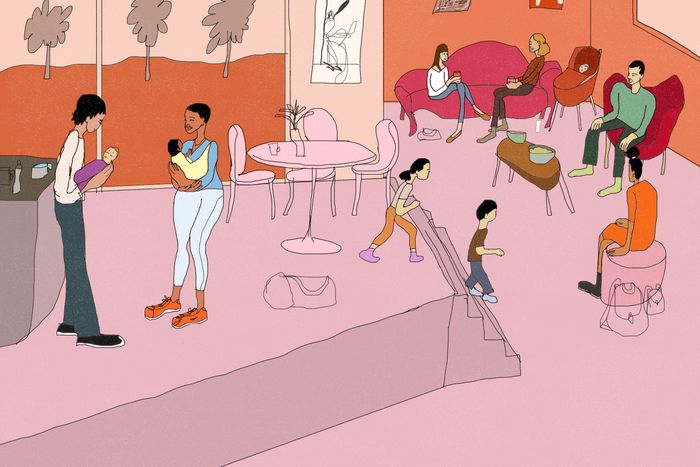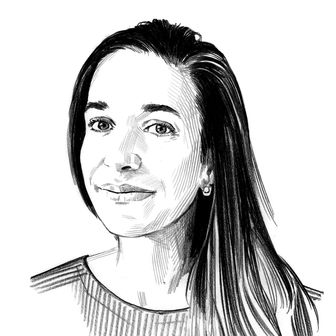
Ten years ago, Kelly Williams Brown’s advice book Adulting: How to Become a Grown-up in 468 Easy(ish) Steps was published. The book’s success went beyond its place on the New York Times’ best-seller list to become part of the Obama-era Zeitgeist. The word adulting acknowledged that adolescence now extends into the second and often third decade of life and that young adults prefer self-deprecating their way to some kind of behavioral maturity rather than making a series of major decisions and learning to live with the consequences, which, from what I understand, is what “adulthood” used to be about.
The word adulting has jumped the shark (Bill Maher’s latest show on HBO is called #Adulting, goddess help us), but in 2013 a lot of people found it cute. Recall, this was the era of Parks and Recreation, of “put a bird on it” — less curdled times. Brown does not claim to have invented the verb form of the noun, but she did single-handedly popularize it. “I knew it was annoying the first time I said it,” she told me. “And then I consigned myself to say it 17 million more times.”
I first met Brown in 2006, about six years before she would publish her breakthrough. She was an intern at a weekly business newspaper called New Orleans CityBusiness, where I was doing a pretty bad job of assembling an annual “Book of Lists.” Brown was the kind of intern who strikes fear into the heart of incompetent employees like myself: She was charming, hardworking, and ambitious. She was good at what she did even when she thought she wasn’t. She made me look bad.
But it was hard not to like her. She smoked cigarettes and was a good hang, always up for some gossip. It’s just true that some people shine bright and also aren’t villains. I think it’s taken me the better part of the past decade to realize that, myself. I didn’t work with Kelly for very long, but I didn’t forget about her. In 2013, when Adulting came out with her face on its cover, I was not surprised.
Brown’s advice, most of which she mined from experts and trusted friends, breezes along, ranging from the importance of paying bills on time to getting your tires changed to not hooking up with your ex. Some of it is evergreen Emily Post stuff repackaged for a new generation: “Step 118: If you forget someone’s name, try to trick them into saying it.” But there’s also contemporary wisdom for the newly independent with an emphasis on the “independence” part: “Step 305: Do not treat your friends like your unpaid life coaches.”
As a cultural document, Adulting sums up the anxiously self-reliant ethos of early-aughts millennials as accurately as the Whole Earth Catalog summed up the back-to-the-land fantasies of early 1970s boomers. Any self-help book reflects the nervous fixations of a group, and Adulting is a reminder that, during the Obama years, millennials were on the hook for everything the boomers had squandered, and they hadn’t started talking back yet. We were pieces of shit back then, remember? When were we going to get our acts together?
There was a lot of pressure, in the years following the 2008 housing crisis, to perform genuflections to the markers of neoliberal success: saving for a first home, dressing for the jobs we wanted, killing it at work before settling down to raise kids with the domestic partners with whom, in those halcyon days, we expected to equally and fairly divide our household labor.
Ten years later, the book still sells. The number of steps toward adulting went up to 535 with the second edition, published in 2017. She still gets occasional royalty checks — enough for a weekend getaway, if not enough to pay the rent. Which makes sense: It’s not as if adolescence is suddenly getting shorter; if anything, the COVID era’s homeward return by many young adults has added sand to the gas tank.
But demographic pressures, labor-market conditions, and social norms have evolved a lot in the past decade, and the concerns of people in their 20s and 30s are not what they were in 2013.
All around me, people are talking about crumbling care infrastructures and the loneliness that accompanies family care work. For the “sandwich generation,” adulthood has been marked by figuring out how to juggle the competing needs of their children and aging parents. Mutual aid became a practice not just for activist communities but for neighborhoods struggling with exploding housing and food prices, which acutely impacts younger adults.
Parents have been marooned without child care, and child-free people have been wondering how they can offer help when young parents seem so unaccustomed to asking for it. Step 254 in Adulting is “Hang up or fold things, as they prefer.” Okay, but allow me to propose Step 536 for the 2023 edition: Don’t worry about the mess.
Brown lives in Oregon now and works in academic comms at a small university, which is, coincidentally, my day job too. When I called her up earlier this year, I wished we were both back in New Orleans on her balcony, smoking in the dark. We compared notes on a few rumors from back in the day, and then I asked her what she’s learned about being an adult since Adulting came out. If Adulting were written now, what would its lessons be?
“I think I’d have a chapter on how you keep moving forward when you so deeply don’t feel like you can,” she said. “Which is a question that I think all of us have in one way or another had to grapple with over the last couple years.”
The success of Adulting catapulted Brown out of living paycheck to paycheck as a reporter in rural Mississippi. The change was sudden and intense and, ultimately, led to a “catastrophic breakdown of the self.” Along with exciting opportunities like developing an Adulting sitcom with J.J. Abrams came the inevitable, relentless scrutiny from strangers. The irony is not lost on Brown that Adulting’s best advice about creating a convincing illusion of organization and self-confidence was no match for the state of being a visible young woman on the internet.
In the wake of the book’s success, Brown had, as she put it, a doozy of a time. The book’s premise didn’t help. “When bad things happened, which they did, it became something more — if I ask for help and tell people I’m not okay, am I undermining the central point of my whole career?”
“I kind of disappeared from everything. It was easier than trying to tell people what was happening. Divorce, Trump election, I broke my elbow and fractured my shoulder, my dad got cancer, my grandma died, my cat died, I fell into a deep depression. I quietly quit my job as the adulting girl.”
Brown has written other books since Adulting, but she has kept a low profile. “When I reemerged, it was like, Okay, how do we construct a life that has meaning, that isn’t based on what strangers on the internet think? Where you know people, where you feel like your days are spent on something greater than yourself? Because I don’t like focusing on myself — it’s a bummer: I’m petty, I’m small, I think about how great I am, I think about how shitty I am. It’s all very boring. I get petulant. I would say that the difference now is that I try really hard to be aware of my own ugly tendencies and try to reel them back in and redirect that energy in more positive ways.”
“I would definitely have a chapter on resilience,” Brown continued. “I’ve seen some … not really questions but more existential ponderings arise in myself and in my friends: How do I find something that is more important to me than myself? How do I integrate myself with humans in a larger community? Where do I fit in that?”
Brown does not plan to have kids, and she’s interested in the formation of meaningful relationships with kids and young people. “That’s something that’s brought me a lot of joy,” she said. This topic is coming up a lot lately. For her newsletter Culture Study, Anne Helen Petersen wrote about caring for others and allowing oneself to be cared for. The cookbook author Samin Nosrat described the “anti-nuclear family” she eats with every Tuesday. “Chosen families” are lifelines for queer communities, and the concept is becoming more widely discussed.
Our modern understanding of childhood was invented in the late 19th century, and I wonder if our contemporary idea of what it means to be an adult emerged out of that same definitional project: being an adult is to be a not-kid. Kids are dependent on others and need constant care. Therefore, adults are independent and can look after themselves.
It feels like this definition of adulthood is wearing thin under the pressures of our times. Adults can survive independently, but should they? Is there really any historical precedent at all for fully independent adults apart from that which benefited a capitalist consumer marketplace? It’s obvious that retailers would rather we each had our own living space and didn’t share our appliances or tools — more space that needs filling means more demand for stuff. And, yes, sharing is a pain sometimes, but maybe it’s because most of us have so little experience with how to do it.
All of these conversations about how to create enmeshed communities where we give and receive support emerge from our shared lack of experience. All we know is self-reliance; it’s the only thing we’ve learned to work toward. Adulthood as we know it is a series of consumer milestones: car, office attire, non-Ikea couch, first home, KitchenAid stand mixer. What if it were understood completely differently? We define adulthood as a point at which you can leave a community behind and start out on your own. Imagine if, instead, it was a point at which a community could rely on you to show up for others?
Ten years after Adulting, young adults need help finding a sense of belonging more urgently than they need to convince a prospective boss to hire them. Enduring the book’s success has taught Brown a whole new set of lessons — maybe it’s time to put them all into a new book about being a good neighbor and friend. Neighboring? You can call her agent, but you’re better off looking for Brown at her local trivia night, where she is the host.
More From This Series
- Parenting Through Our Control Issues
- When Kids Are Addicted to their Phones, Who Is to Blame?
- Why Are Parents On TikTok So Angry?





